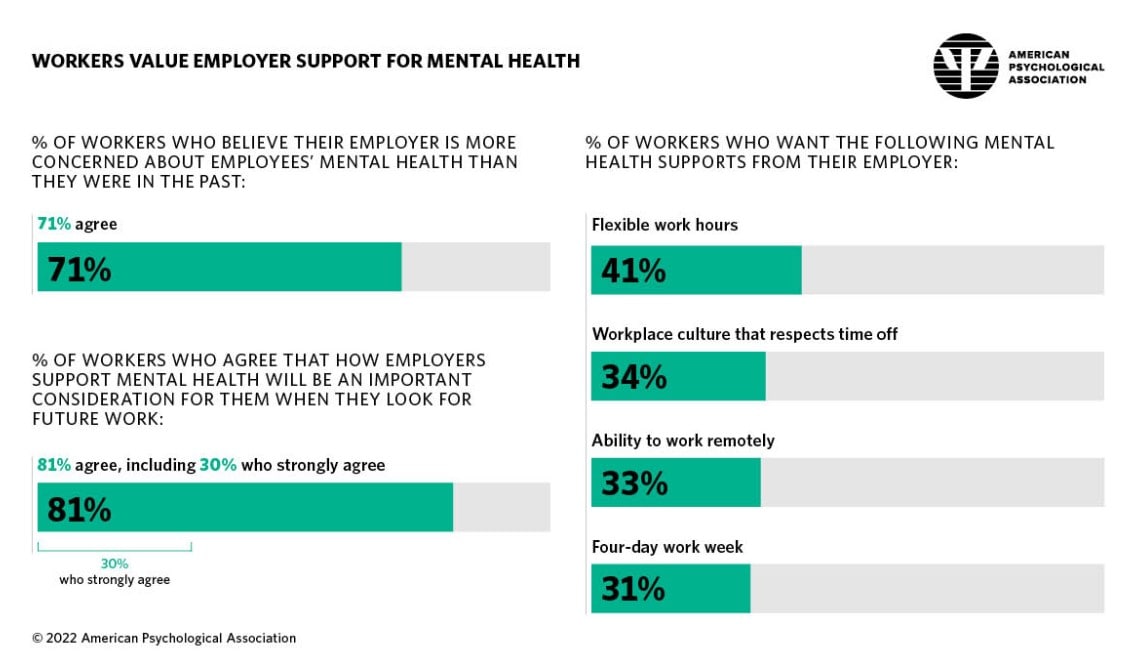Is a 4 Day Work Week Better for Mental Health?
Discover the mental health benefits of a 4-day work week. Find out how shorter work hours can enhance your overall quality of life.

According to the 2022 survey by the American Psychological Association, 75% of American employees experience severe work-related stress, highlighting the urgent need for action.

Source: American Psychological Association
One effective solution to address work-related mental health issues is adopting shorter work weeks. Transitioning to a 4-day work week offers numerous mental health benefits that can significantly enhance overall well-being.
Join us at 4 Day Week as we explore the transformative potential of shorter work weeks and their positive impact on mental health.
Why Is Prioritizing Mental Health Important for Work?

The importance of prioritizing your mental health while working cannot be emphasized enough.
Work environments are often demanding and can exert immense pressure, making it crucial to recognize when your mental well-being is starting to decline.
So, let's delve deeper into why prioritizing your mental health is essential for your work life.
It Keeps You Flexible
When you prioritize your mental health, you can recognize your strengths and limitations by acknowledging your stressors.
This self-awareness is crucial in the workplace, allowing you to strive for your best performance. And it's only possible when you manage to recharge enough during the week.
By caring for your mental well-being, you become better equipped to tackle work challenges, manage stress levels, and cultivate resilience, ultimately enabling you to produce your highest quality work.
It Helps Lessen Anxiety and Depression
Taking care of your mental health significantly reduces work-related anxiety and depression, allowing you to be more present and engaged in your professional and personal life.
Numerous studies highlight that individuals with mental health conditions, such as depression and anxiety, often encounter difficulties in the workplace.
Without proper attention, these challenges can manifest as:
- Missed deadlines
- Low work quality
- Decreased involvement in work culture
Moreover, mental health issues can increase absenteeism, directly affecting job security. Prioritizing your mental well-being is crucial for sustaining your job and preserving your overall quality of life.
It Maintains Healthy Productivity
As work-related stress increases, your engagement, motivation, and productivity suffer. However, by managing your mental health, you gain the ability to effectively organize even the most complex tasks, enabling efficient completion.
This positive productivity and genuine engagement foster a healthy work environment.
Work-Related Factors That Can Affect Mental Health

To have better mental health at work, it is crucial to recognize the factors that can impact our well-being.
Understanding the work-related elements that influence our mental health allows us to take proactive steps in caring for ourselves.
Would you like a 4 day work week?
Performance Pressure
Experiencing constant and overwhelming work pressure can significantly contribute to high levels of employee stress.
The expectation to perform at your best every day, without sufficient personal time to relax, can negatively impactality of your work.
As a result, when individuals perceive their performance as declining, it can lead to increased stress levels.
Lack of Work-Life Balance and Autonomy
A high-pressure work life often leaves employees little time to enjoy their personal lives.
This imbalance significantly strains mental health, as individuals won't have enough time to unwind and look at other essential aspects of life, such as relationships and self-care.
Therefore, neglecting these areas can result in feelings of loneliness, sleep disturbances, and challenges with time management, which can worsen depression and anxiety.
When employees are allowed to create a positive work-life balance, they are more likely to experience greater happiness at work and perform at their best.
Lack of Recognition and Support
Workplaces that don't pay attention to employee well-being and neglect providing adequate support can create an overwhelmed workforce.
Increased work-related stress often leads to conflicts and reduced collaboration, negatively impacting team productivity.
Conversely, when employees receive appropriate mental health support, they feel validated and gain confidence in their ability to perform effectively.
Toxic Workplace Environment
A toxic workplace can involve various physical and emotional factors contributing to a toxic work atmosphere.
This may include:
- Unsafe working conditions
- Extended working hours
- Low pay
- Discrimination
- Harassment
- Favoritism etc.
Whenever a workplace consistently causes significant stress and dissatisfaction among its employees, it is considered toxic.
What are the 4-day Work Week Mental Health Benefits?

In a 4-day work week, you typically work four days from Monday to Friday while receiving a full salary. The aim is to complete a maximum of 32 hours per week.
lLLet'sexplore how this schedule can positively impact your mental health.
1. It Reduces Stress and Burnout
The primary mental health benefit of a 4-day work week is the reduction in continuous work pressure.
The UK's Four-Day Week Pilot, a 2022 trial program involving 61 companies and around 2,900 employees, assessed the benefits of a 4-day work week.
After implementing this schedule for six months, employees reported significant reductions in stress levels (40% of employees), anxiety, fatigue, and burnout (70% of employees).
This is particularly important as experiencing burnout can lead to mistakes at work, missed deadlines, and even job insecurity.
Simply working one less day during the week can alleviate a significant amount of work-related stress, reducing the risk of burnout.
2. It Provides Extra Time to Foster Healthy Habits
Working longer hours often leads to poor lifestyle choices, such as unhealthy eating habits, lack of exercise, and neglecting social interactions.
While you may complete your tasks, these choices can have a detrimental impact on your mental health and may not reflect your actual value in terms of work performance.
A 4-day work week allows you to establish routines that support your overall well-being and enable you to perform at your best.
It offers the extra time needed to prioritize healthy habits that contribute to your personal and professional success.
3. It Enhances Financial Well-being
Consider the expenses associated with the traditional work week. By reducing the number of workdays, you can save on commuting costs, work-related lunches, and supplies, among other expenses.
Furthermore, you're less likely to get mentally or physically sick from working long and strenuous hours, leaving you with more funds for emergencies.
Overall, reducing financial burdens directly contributes to workplace happiness, which, in turn, positively impacts your mental health.
4. It Improves Work-Life Balance
A traditional 5-day workweek can be more challenging to provide you with a healthy balance between work and life, especially in mentally demanding industries such as tech.
Insufficient time off often leaves little room for family, friends, and personal hobbies, all contributing to positive mental health.
So, your best chance to achieve a healthy work-life balance lies in working a 4-day week.
5. It Reduces the Risks of Sleep Deprivation
Switching to a 4-day workweek allows workers to enjoy an average of 8 hours of sleep per night, more than they typically get during a five-day workweek.
Research led by Juliet Schor, a renowned sociologist and economist at Boston College, reveals that employees who embrace a 32-hour workweek experience an average of 7.58 hours of sleep per night. This is nearly a full hour more than when they worked the traditional 40-hour workweeks.
Therefore, quality sleep is crucial for optimal mental health. By obtaining more sleep through a reduced work schedule, your mind gains clarity, creativity flourishes, and you enhance your ability to excel in the workplace.
6. It Can Lead to Overall Job Satisfaction
Job satisfaction is crucial in promoting positive mental health as it gives you a sense of value and fulfillment in your work.
Achieving overall job satisfaction goes beyond monetary rewards. Having the freedom to manage your personal life and experiencing reduced work-related stress are critical factors in minimizing negative emotions towards work and fostering genuine fulfillment from your job.
Final Thoughts
The truth behind the saying I'll work and no play makes Jack a dull boy is now more evident than ever, with multiple studies demonstrating the negative impact of long work hours on mental health.
So, if you are interested in prioritizing your mental health by transitioning to a 4/10 hour job, explore the current job openings available at 4 Day Week.
We offer rewarding opportunities that allow for remote and flexible work arrangements. Moreover, we answer the frequently asked questions about the 4-day workweek.